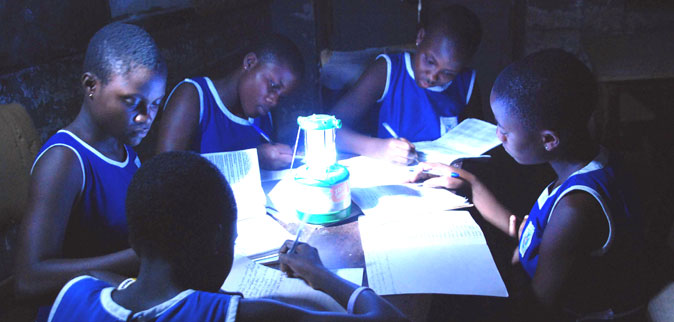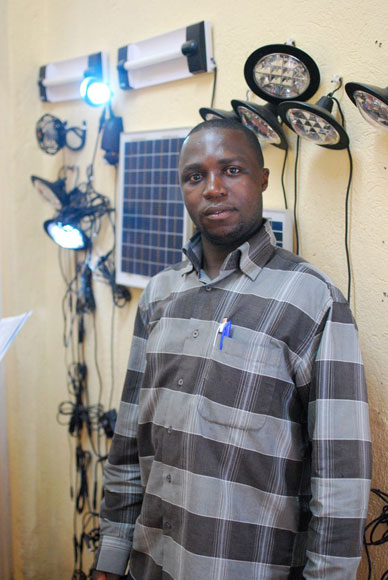Most of us love a bit of technology that will make our lives easier or save us money. I don’t know how I got by before I had my iPhone – and I’m a bit of a Luddite.

These days there are loads of technologies that both save us money and help us do our bit towards saving the planet. I use an electricity monitor which shows how much energy I’m consuming, meaning I remember to switch things off and keep both my bills and my emissions down. And my new boiler has an ‘eco’ option so that water isn’t heated when I don’t need it.
But these are pretty developed country focused solutions to help reduce our emissions. As a development worker, I’m interested in technologies that help poor people in developing countries, where emissions are generally already low. It’s here that technology is important to help countries develop and reduce poverty in a way that does not lock them into using dirty fossil fuels for 30 years or more.

With energy demand in developing countries set to treble by 2050 on current trends, rapid development and deployment of new technologies is crucial to efforts to cut emissions. But when I refer to ‘technology,’ it’s not just about low carbon or renewable energy. It’s also about adaptation to climate change (for example, flood and drought control), sustainable agriculture, and forest and water management. Technology is equally important to all these areas.

My colleague Leanne Jones has just returned from a fascinating pre-Cancun meeting in Delhi to try to make progress on technology – one of the key issues that will be addressed in the negotiations.
The Indian and Mexican governments – who are world leaders in driving the development of climate technologies in their countries – got people together ahead of this month’s negotiations. Because technology is so important to achieving climate change mitigation and adaptation, parties in the negotiations in Cancun will be seeking to launch a ‘technology mechanism’ to provide support to developing countries to build their own relevant technological responses to climate change.
While this may be one area of the negotiations where progress is made, we also need to take practical action to move things forward should the negotiations continue beyond Cancun. This includes accelerating private sector engagement, as with the UK-India Business Leaders Climate Group which brings together UK and Indian corporate leaders, and research such as that which the UK is co-funding with India on solar power.
At DFID, we’ve been working on a package of programmes that address these challenges and reach the poorest communities. This includes:
- Exploring options for a number of Climate Innovation Centres – national hubs to encourage local innovation in environmental technologies, leading to the creation of new jobs and businesses.
- Research to learn from other models of global, collaborative research and development (for example in the agriculture and health sectors), and what this means for setting up a similar approach to climate technology.
- Scoping out whether we might use X-prizes – competitions that reward the first team that successfully achieves a specific goal, such as a radical technological breakthrough that addresses a problem with no existing solution – to develop pro-poor environmental technologies.
With the right policies and support it is possible for developing countries to leapfrog ahead of developed ones – as demonstrated by India’s Suzlon, who are now a major manufacturer and developer of wind turbines. It’s this kind of progress that we need to keep up the momentum on – whether we achieve a technology deal in Cancun, or further down the road.

1 comment
Comment by Bruce Potter posted on
Since the European Centre for Development Policy Management sponsored several related activities in the early 1990's there has been a cadre of island-based and -focussed innovators and technologists who have been trying to secure support for an island-driven network or series of networks to SHARE solutions to sustainable development problems among small islands. For a time the UK Government provided some support to these activities, especially during Iain Orr's leadership of the Biodiversity Team at the Foreign and Commonwealth Office. Graeme Robertson of the Scottish islands is president of one of the artifacts of these initiatives, the Global Islands Network, operating these days out of Skye.
The UN system has tried to run with the concept under the SIDSNet umbrella a couple of times, but they seem handicapped by a short attention span, variable funding, and an impractical definition of SIDS -- many of which are neither small nor islands, or sometimes both (e.g., Belize).
Good luck with the DfID initiative sketched here, but if it succeeds, it may just be because it is a tool for major transnational corporations in some large developing countries to get marketing assistance (think TATA or PEMEX). And those impacts on small islands may be indistinguishable from major transnational corporations in some large developed countries.